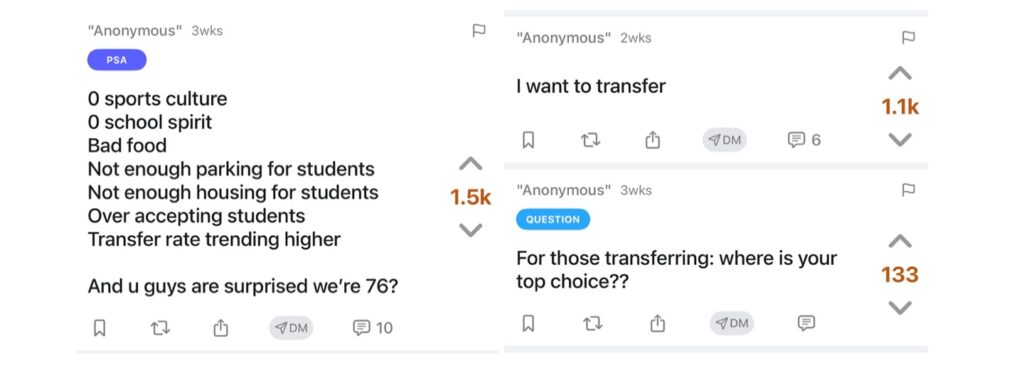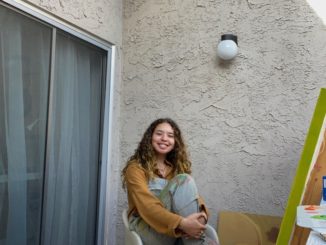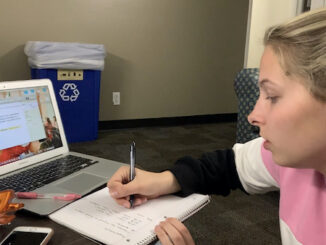
Community means everything, just ask Pepperdine students.
Pepperdine University’s small-school nature provides students with a unique environment to foster tight-knit communities and close relationships. Yet, this intimate atmosphere comes with a caveat: Whether or not a student loves Pepperdine can be drastically shifted depending on what their community thinks.
Lindsay Hall, a junior international studies major, said she loves Pepperdine because of the community she has formed on campus. The in-person communication that she has with those around her helps fuel a sense of school spirit.
“I find that the more I talk positively about Pepperdine, I get more excited and love it even more,” Hall said. “The second I, or someone else, says something bad about Pepperdine it’s a moment of feeling, ‘That’s so true I did not even think about that’ and that can bring down the mood.”
Communication professors said in-person and digital communication shapes how individuals view community, either reinforcing positive or negative opinions about Pepperdine.
Unconventional college experience: Students’ perspectives on Pepperdine
Pepperdine students hold a wide range of attitudes surrounding their personal college experience and how they interact with the community on campus.
A Pepp Post Poll of 54 students found that over 80% rate Pepperdine’s campus community as either good or very good.
However, the poll found that only around half of respondents believe Pepperdine is providing them with their desired college experience. Along with that, more than half of the students surveyed have contemplated leaving Pepperdine.
The poll showed that students’ interactions with their communities help shape their views of campus life. Respondents said online platforms tend to negatively impact campus morale as opposed to in-person conversations.
“Pepperdine is not for everyone,” junior business major Nathanial Evans said. “But for the people that it is for, it is amazing.”
Students believe that Pepperdine’s small-school nature and Christian values create a unique atmosphere on campus that differs from the “traditional” college experience.
Kiara Bromberg, a junior integrated marketing communication major, said school spirit at Pepperdine comes through the relationships that are formed as opposed to more traditional universities where spirit comes from large-scale events and sports teams.
For Bromberg, feeling a strong sense of community on campus enriches her college experience.
“It puts me in such a good mood and so happy to walk around campus,” Bromberg said. “It feels like a family, because it’s so small.”
Evans said the small campus size and undergraduate population is extremely important for his experience, as constantly seeing friends, even if it is just to stop for a short conversation, increases his sense of connection on campus.
Communication’s role in shaping community on campus
Interpersonal communication aids students as they form communities on campus, professors said. However, the types of conversations occurring within communities can affect student’s opinions on Pepperdine in various ways.
On one hand, in-person conversations allow Pepperdine students to exchange their thoughts and feelings in a beneficial way.
Brant Weir, a junior in the 3/2 engineering program, said having in-person conversations about Pepperdine in his friend group helps him to maintain an optimistic outlook on the university.
“When you are looking for good things, you find good things,” Weir said. “Whenever someone is talking bad about Pepperdine, another friend points out something the school does have and it all resolves in goodness.”
Similarly, junior biology major Ashley Lively said her community of friends love Pepperdine and are all grateful to be here. Lively said they try to only focus on the good elements of Pepperdine and ways to make their experience better.
Public Relations Professor Klive Oh said interpersonal communication allows students, such as Weir and Lively, to form communities where they can engage in dialogue about Pepperdine that puts forth positive thinking and an optimistic mindset.
On the other hand, students might feel negatively about campus life if their friend group tends toward negative dialogue about Pepperdine.
Andreas Marouf, a sophomore sport administration major, had his best friend transfer out of Pepperdine his first year. Marouf said hearing his friend express a strong dislike for Pepperdine put thoughts into his head.
“When someone you are really close to wants to leave it makes you question why am I here?” Marouf said. “What would I get going somewhere else?”
Going into his sophomore year, Marouf said he worked really hard to try and be involved on campus by joining Greek life. Through joining the Sigma Phi Epsilon fraternity, Marouf said he finally got a grasp on the great sense of community that exists at Pepperdine.
Digital media’s impact on communication about Pepperdine
Online communication is a popular way students communicate their opinions about Pepperdine, specifically through the networking platform Fizz.
Fizz is an anonymous posting app.
The poll found that 72% of students have Fizz. Nearly 30% of respondents occasionally look at the content on the app and nearly 56% of respondents said the content on the app comes up in conversations.
“Anonymity is like a mask that you could put on,” Oh said. “The good side is that you can speak your mind without recognition but the downside of that is that your opinions, even if they are slightly negative, might go to the extreme because that mask acts as a shield.”
Evans said Fizz often fixates on the negative aspects of Pepperdine.
“These perspectives tend to get amplified and a lot of the extremes are brought to light when the majority of people do not believe them,” Evans said. “Fizz is the main culprit, where some people have really strong opinions and it becomes easy to think that these are the main opinions Pepperdine students have.”

Pepperdine Psychology Professor Priscilla Yau said the principle of groupthink is at fault for making extreme perspectives appear normalized. Along with that, she said human nature tends to focus more on the negative comments.
“You assume that everyone thinks the same way, even if there are only a few messages about negative effects of being at Pepperdine and those are the voices that are the loudest,” Yau said.
Lively said looking at Fizz can take away from a student’s experience by amplifying parts of Pepperdine that need improvement. She said it can be difficult to maintain a positive attitude and mindset when looking at Fizz.
“If the caf food is bad, at least we have the beach,” Lively said. “I try to block out the negative elements because I am so grateful to be here, but when I look at Fizz I do think to myself why isn’t that part of Pepperdine better.”
Expert voices explain how communication shapes community development
Sarah Stone Watt, the divisional dean of Communication, said in-person dialogue is important for students when discussing their attitudes toward Pepperdine, as it forces people to think about the implications of what they are saying through receiving immediate feedback.
“We develop relationships, trust and the ability to get feedback through communication and that is really important to building community,” Stone Watt said. “That is why, when we are in-person, we are able to adapt and know that if I hold an opinion and they respond in a shocking way, there can be a conversation and adjustment.”
Stone Watt said in-person dialogue allows students to freely express their opinions on Pepperdine while knowing that there can be healthy back-and-forth conversation.
Oh said there are key opinion leaders in every community who are influential in shaping the attitudes and beliefs of their community.
“When there is a group of people, they (key opinion leaders) might set the tone and an agenda for what gets to be talked about and what becomes a popular narrative within the group,” Oh said. “In that way, interpersonal communication can play a role in what we talk about, what we say when we talk about this, and what are some first opinions that we set forth.”
When key people share their perspective, that can influence other students’ opinions, as these key individuals shape the conversation.
Public Relations Professor Jamila Cupid said confirmation bias can further reinforce a student’s beliefs, as they continually seek out conversations that reinforce their pre-established opinions.
Cupid said when individuals are constantly reaffirming their predetermined perspectives, it could either heighten their love for the school or force them into negative tunnel vision.
“On the positive side of things, if an individual has a healthy outlook on what community is and what their community is meant to be, then more and more messages can keep opening up room for growth and willingness to try new things,” Cupid said.
Tools for creating a positive community at Pepperdine
Cupid said in-person communication shapes one’s idea of community, so being involved on-campus is the best way to start forming healthy, positive communities.
After coming back from abroad, Bromberg said she is trying really hard to get into school groups and different clubs. She joined a band, is doing the National Society for Student Success, and started Jumpstart to continue forming connections with new students.
“It was hard freshman year and I regret not being more involved, but I have two years so I am so excited to get to meet more people everyday,” Bromberg said.
In order to cultivate her own positive Pepperdine experience, Hall believes that having an uplifting in-person community and not feeding into negativity online, specifically through anonymous apps like Fizz, is important.
“I try to stay positive about Pepperdine the best that I can, overall it is such a great environment with the faculty, location and friends,” Hall said.
Kayla Bruckert reported this enterprise story in Jour 241 during the Fall 2023 semester under the supervision of Dr. Christina Littlefield and Dr. Theresa de los Santos. Dr. Littlefield supervised the web article.




